Are you curious about the Boston Terrier, one of the most charming and beloved dog breeds around? Well, you’re in the right place! In this comprehensive guide, we will delve into all things Boston Terrier. From their unique characteristics to their care requirements, we’ve got it all covered.

Introduction
Did you know? The Boston Terrier is often referred to as the “American Gentleman” due to its dapper appearance and friendly disposition. But there’s much more to this breed than meets the eye.
Welcome to the world of Boston Terriers, where we aim to provide you with an in-depth understanding of this delightful breed. While there’s no shortage of information out there about Boston Terriers, we believe in the importance of a detailed and up-to-date source.
Boston Terrier: The Basics
Let’s start by getting to know the Boston Terrier a bit better. Below is a table that outlines various key aspects of this breed:
| Field | Information |
|---|---|
| Height | 15-17 inches (38-43 cm) |
| Weight | 10-25 pounds (4.5-11.3 kg) |
| Life Span | 13-15 years |
| Good with | Families, singles, seniors |
| Temperament | Friendly, intelligent, lively |
| Intelligence | Very intelligent |
| Shedding Amount | Minimal |
| Grooming | Low maintenance |
| Exercise Needs | Moderate |
| Energy Level | Moderate |
| Barking Level | Low |
| Drool Amount | Minimal |
| Coat Length/Texture | Short, smooth |
| Colors | Black and white, brindle, seal |
| Patterns | Various |
Table of Contents
Understanding Boston Terriers
History and Origin
Boston Terriers have a fascinating history. They originated in the late 19th century in the United States. The breed was created by crossing the now-extinct White English Terrier and the Bulldog, resulting in the charming, tuxedo-clad dogs we know today.
Appearance
Boston Terriers are known for their sleek, tuxedo-like coat, which is typically black and white, but can also be brindle or seal. They have a square-shaped head, expressive round eyes, and erect ears. Their compact and muscular build gives them an endearing appearance.

Temperament
These dogs are renowned for their friendly and affectionate nature. They make excellent companions and are known to be good with families, singles, and even seniors. Their intelligence and liveliness add to their appeal, making them a joy to be around.
Exercise and Energy
While they have a moderate energy level, Boston Terriers still require regular exercise to stay healthy and happy. Daily walks and some playtime should suffice. They’re adaptable to apartment living but enjoy outdoor adventures too.
Grooming and Shedding
One of the perks of having a Boston Terrier is their low-maintenance grooming needs. Their short, smooth coat requires minimal attention. They are also light shedders, which means less cleaning up after them.
Conclusion
In this section, we’ve laid the foundation for our comprehensive guide on Boston Terriers. From their physical characteristics to their temperament and care needs, you now have a solid understanding of what makes these dogs so special. Stay tuned as we explore each aspect in more detail in the upcoming sections. Whether you’re considering bringing a Boston Terrier into your life or you’re simply a dog lover seeking knowledge, we’ve got you covered!
Breed History and Origin
Exploring Their Roots
The Boston Terrier, often lovingly referred to as the “American Gentleman,” has a rich and fascinating history that dates back to the late 19th century in the United States. To truly understand this delightful breed, we must journey back in time and explore the breeds that played pivotal roles in its formation.
1. Bulldog Ancestry: The Boston Terrier owes much of its character and appearance to its Bulldog ancestry. Bulldogs were bred with White English Terriers in the late 1800s in the Boston area, resulting in the birth of this unique breed. The Bulldog influence is evident in the Boston Terrier’s square-shaped head, muscular build, and distinctive tuxedo-like coat.
2. White English Terrier: The other half of the Boston Terrier’s genetic makeup comes from the White English Terrier, a breed that sadly no longer exists. This terrier brought its refinement, agility, and elegance to the breed, contributing to the Boston Terrier’s charming and well-mannered nature.
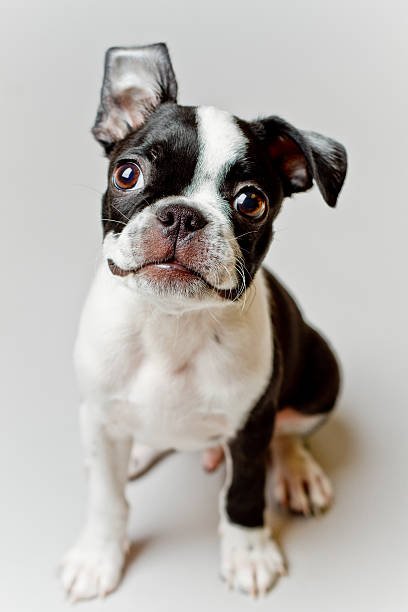
Notable Traits
The Boston Terrier’s history is not just a tale of lineage; it’s also a story of the breed’s standout qualities that have endeared it to so many dog lovers over the years.
1. Tuxedo Appearance: One of the most striking features of Boston Terriers is their tuxedo-like coat, characterized by a black and white coloration. This distinctive appearance has earned them the nickname “American Gentleman,” as they often resemble little canine gentlemen dressed in formal attire.
2. Friendly Disposition: Boston Terriers are renowned for their friendly and sociable nature. They are often described as excellent companions, making them a popular choice for families, singles, and even seniors. Their amiable temperament has solidified their place as one of America’s favorite breeds.
3. Intelligence and Trainability: These dogs are not just good-looking; they’re also highly intelligent. Their ability to learn commands and perform tricks makes them a joy to train. Their sharp minds make them excellent participants in dog sports and activities.
4. Compact and Muscular Build: The Boston Terrier’s physique is another standout feature. They are compact and muscular, making them agile and capable of enjoying a variety of physical activities. This athleticism, combined with their friendly disposition, makes them excellent playmates.
Relevance of Origin
The Boston Terrier’s origin story continues to influence the breed’s characteristics and appeal today. Understanding this history sheds light on why Boston Terriers are the way they are.
1. Legacy of the American Gentleman: The nickname “American Gentleman” reflects not only the Boston Terrier’s appearance but also its demeanor. Their friendly and well-mannered behavior is a testament to their historical breeding for companionship and loyalty.
2. Adaptability: Boston Terriers are adaptable dogs, and this trait can be traced back to their origins. Their ancestors were bred to be versatile and capable of both hunting and companionship. This adaptability has made them equally at home in urban apartments and rural settings.
3. Tuxedo Coat: The tuxedo-like coat, a nod to their origins, has remained a defining feature of Boston Terriers. This distinctive appearance has made them stand out in the canine world and ensures they are easily recognizable and beloved by dog enthusiasts worldwide.
In conclusion, the history and origin of the Boston Terrier are as unique and captivating as the breed itself. From their Bulldog and White English Terrier ancestry to their distinctive appearance and friendly disposition, every aspect of their past has left an indelible mark on this charming breed. Understanding their roots provides valuable insights into why Boston Terriers are such cherished companions today. In the next section, we’ll delve into the physical characteristics of these remarkable dogs in more detail.
Understanding the Boston Terrier Breed’s Traits
Physical Characteristics
When it comes to the Boston Terrier, their physical characteristics are a significant part of what makes them so charming and unique. Let’s take a closer look at their size, coat type, coloration, and other distinguishing features.

1. Size: Boston Terriers are a small to medium-sized breed. On average, they stand about 15-17 inches (38-43 cm) tall at the shoulder and typically weigh between 10-25 pounds (4.5-11.3 kg). Their compact stature makes them ideal for apartment living.
2. Coat Type: Boston Terriers have a short and smooth coat. This coat type is not only visually appealing but also low-maintenance. Their sleek fur requires minimal grooming, making them an excellent choice for those looking for a breed that doesn’t require hours of brushing.
3. Coloration: The classic Boston Terrier coat colors are black and white, resembling a tuxedo. However, they can also come in brindle or seal, with white markings. These distinctive color patterns are part of what gives them their “American Gentleman” nickname.
4. Distinguishing Features: Boston Terriers have a square-shaped head with expressive, round eyes. Their ears are typically upright and bat-like, giving them an alert and attentive appearance. They also have a short, well-proportioned tail.
Temperament Overview
Boston Terriers are known for their friendly and affectionate temperament, making them excellent companions. Let’s delve deeper into their personality traits and discuss their suitability as family pets.
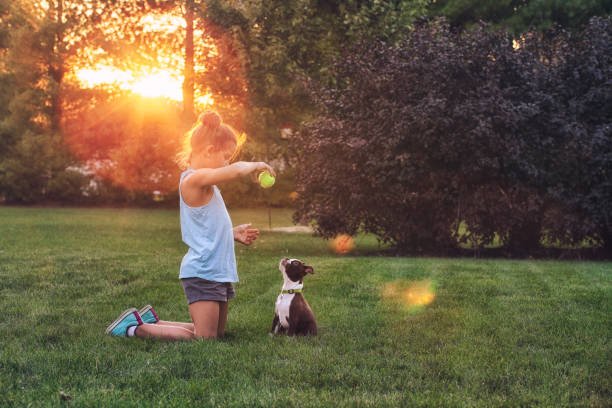
1. Family-Friendly: Boston Terriers are often described as “people dogs.” They thrive on human companionship and are known to form strong bonds with their families. This breed is a great choice for families of all sizes, including those with children and seniors.
2. Good with Children: Boston Terriers are generally great with kids. Their friendly disposition and patient nature make them suitable playmates for children. However, as with any dog, it’s essential to teach children how to interact safely with pets to ensure a harmonious relationship.
3. Compatibility with Other Pets: Boston Terriers are usually amicable towards other pets, including cats and other dogs. Proper socialization from a young age can help them get along with different animals. However, they do have a bit of a prey drive, so supervision may be necessary with smaller pets like hamsters or birds.
4. Temperament Traits: Boston Terriers are known for being intelligent, alert, and lively. They are quick learners and enjoy mental stimulation. While they are friendly, they can also be a bit stubborn at times, so consistent training is essential.
Environment Needs
Boston Terriers are adaptable and can thrive in various living environments. Here are some considerations for their living conditions:
1. Space: While Boston Terriers are relatively small, they don’t require a vast amount of space. They are well-suited to apartment living as long as they receive daily exercise and mental stimulation.
2. Temperature: Boston Terriers are sensitive to extreme temperatures. They can struggle in very hot or cold weather due to their short coat and brachycephalic (flat) faces. It’s crucial to provide them with a comfortable environment and avoid excessive exposure to extreme temperatures.
3. Exercise: While they don’t need a large yard, Boston Terriers do require regular exercise. Daily walks, playtime, and interactive toys are essential to keep them mentally and physically engaged.
Training and Socialization

Training and socialization are crucial for Boston Terriers to ensure they grow up to be well-behaved and confident dogs.
1. Trainability: Boston Terriers are intelligent and can pick up commands quickly. Positive reinforcement training methods work best with this breed. They respond well to treats, praise, and consistency.
2. Socialization: Proper socialization is vital to ensure that Boston Terriers are well-adjusted and comfortable around people and other animals. Early exposure to various situations, people, and environments can help prevent any potential behavioral issues.
In conclusion, Boston Terriers are not just adorable; they also possess a delightful combination of physical traits and a friendly temperament that makes them wonderful companions. Their adaptability to various living environments, compatibility with families and other pets, and their intelligence make them a popular choice among dog lovers. Proper training and socialization are key to ensuring they reach their full potential as loving and well-behaved members of your family. In the next section, we’ll explore their specific care requirements to keep them happy and healthy.
Health Considerations and Care
Taking care of your Boston Terrier’s health is paramount to ensuring a happy and fulfilling life for your beloved pet. In this section, we will delve into common health issues, lifespan, dietary needs, exercise requirements, grooming practices, and more.
Common Health Issues
Boston Terriers are generally a healthy breed, but like all dogs, they can be prone to certain health issues. Being aware of these potential problems and scheduling regular veterinary check-ups can help ensure your Boston Terrier lives a long and healthy life.
1. Brachycephalic Syndrome: Boston Terriers have short, flat faces, which can lead to respiratory issues. This condition, known as brachycephalic syndrome, can cause difficulty breathing, especially in hot weather. It’s crucial to keep them cool and avoid excessive exercise in high temperatures.
2. Allergies: Some Boston Terriers may develop allergies, which can manifest as skin problems or gastrointestinal issues. Your vet can help identify and manage allergies through dietary changes or medication.
3. Eye Problems: Boston Terriers are prone to eye issues such as cataracts, cherry eye (prolapsed gland of the third eyelid), and glaucoma. Regular eye check-ups are essential to catch and treat these issues early.
4. Joint Issues: Due to their compact build, Boston Terriers can be prone to joint problems like luxating patellas (dislocated kneecaps) or hip dysplasia. Maintaining a healthy weight and providing joint supplements can help mitigate these issues.
5. Skin Conditions: Skin problems, including dermatitis and allergies, can occur in Boston Terriers. Regular grooming and a balanced diet can help keep their skin healthy.
6. Cancer: As with many breeds, Boston Terriers can be susceptible to certain types of cancer. Early detection and prompt treatment are crucial in such cases.
Lifespan and Longevity
On average, Boston Terriers have a lifespan of 13 to 15 years. However, with proper care and attention to their health, some individuals have been known to live even longer. Here are some tips for promoting a longer and healthier life for your Boston Terrier:
1. Regular Check-ups: Schedule routine veterinary visits to monitor your dog’s overall health, catch any potential issues early, and discuss preventive measures.
2. Balanced Diet: Feed your Boston Terrier a high-quality, balanced diet that meets their specific nutritional needs. Portion control is essential to prevent obesity, which can lead to various health problems.
3. Exercise: Ensure your dog gets regular exercise to maintain a healthy weight and keep their muscles strong. Daily walks, playtime, and mentally stimulating activities are beneficial.
4. Dental Care: Good oral hygiene is essential to prevent dental problems that can lead to other health issues. Brush your Boston Terrier’s teeth regularly and provide dental chews or toys.
5. Weight Management: Keep your Boston Terrier at a healthy weight to reduce the risk of joint problems and obesity-related conditions.
Diet and Nutrition
Providing the right diet is crucial for your Boston Terrier’s well-being. Here are some dietary considerations for this breed:
1. High-Quality Food: Opt for high-quality commercial dog food that is appropriate for your Boston Terrier’s age, size, and activity level. Look for options that list meat as the primary ingredient.
2. Portion Control: Be mindful of portion sizes to prevent overfeeding. Follow the feeding guidelines provided on the dog food packaging and adjust based on your dog’s individual needs.
3. Avoid Table Scraps: While it may be tempting to share your food, avoid giving table scraps as they can upset your dog’s stomach or lead to obesity.
4. Fresh Water: Always provide fresh and clean water for your Boston Terrier. Proper hydration is essential for their health.
5. Special Dietary Needs: If your Boston Terrier has allergies or specific dietary requirements, consult with your veterinarian to choose the most appropriate diet.
Exercise and Activity
Boston Terriers are lively and energetic dogs that require regular exercise to stay healthy and happy. Here are some exercise and activity guidelines for this breed:
1. Daily Walks: Take your Boston Terrier for daily walks to provide both physical and mental stimulation. Aim for at least 30 minutes of exercise per day.
2. Playtime: Engage in interactive play sessions with toys like balls or puzzles to keep their minds active.
3. Dog Sports: Boston Terriers excel in various dog sports such as agility and obedience training. These activities can be both physically and mentally stimulating.
4. Socialization: Ensure your Boston Terrier interacts with other dogs and people from a young age. Socialization helps them develop good behavior and adapt to different environments.
Grooming and Maintenance
Grooming is an essential part of caring for your Boston Terrier. While they have a short coat that requires minimal grooming, other aspects of their maintenance should not be overlooked:
1. Coat Care: Brush your Boston Terrier’s coat weekly to remove loose hair and distribute natural oils. This will help keep their coat healthy and shiny.
2. Ear and Eye Cleaning: Check and clean your dog’s ears regularly to prevent ear infections. Similarly, keep an eye on their eyes for any signs of irritation or discharge.
3. Dental Care: Brush your Boston Terrier’s teeth regularly to prevent dental issues. Dental chews and toys can also help promote good oral hygiene.
4. Shedding: Boston Terriers are minimal shedders, but they do shed some hair. Regular grooming and brushing can help minimize shedding.
In conclusion, caring for your Boston Terrier involves being proactive about their health, nutrition, exercise, and grooming needs. By staying vigilant and providing the necessary care, you can help your Boston Terrier lead a long, happy, and healthy life. In the next section, we’ll explore the unique characteristics of Boston Terrier puppies and how to care for them during their early stages of life.
Choosing and Adopting a Boston Terrier Dog Breed
When it comes to adding a Boston Terrier to your family, the process involves more than just finding a cute puppy. It’s about making an informed decision, ensuring you’re ready for the responsibilities of pet ownership, and considering the ethical aspects of adoption. In this section, we’ll explore the various facets of choosing and adopting a Boston Terrier.
Reasons for Adoption
Adopting a Boston Terrier can be a rewarding experience for both you and the dog. Here are some compelling reasons to consider adopting one of these lovable canines:
1. Saving a Life: By adopting from a rescue organization, you provide a second chance to a dog in need. Many Boston Terriers are waiting for loving homes in shelters and rescues.
2. Supporting Rescue Efforts: Your adoption fees often contribute to the rescue organization’s ongoing efforts to help more dogs in need. You’re not just rescuing one dog; you’re helping rescue others too.
3. Known Personalities: When you adopt an adult Boston Terrier, you often have a better understanding of their personality and behavior, making it easier to find a dog that fits your lifestyle.
4. Avoiding Puppy Mills: Adopting from reputable rescues or breed-specific organizations helps combat the unethical practices of puppy mills, which prioritize profit over the well-being of dogs.
Research and Preparation
Before you decide to adopt a Boston Terrier, it’s essential to do your homework and make adequate preparations:
1. Understand the Breed: Research Boston Terrier breed-specific traits, including their temperament, exercise needs, grooming requirements, and potential health issues. Ensure that their characteristics align with your lifestyle and expectations.
2. Financial Responsibility: Be aware of the financial commitments associated with pet ownership. This includes not only the initial adoption fee but also ongoing expenses such as food, grooming, veterinary care, and pet insurance.
3. Lifestyle Compatibility: Consider your living situation and daily routine. Ensure that you have the time and space required to care for a Boston Terrier. They thrive on human companionship and need regular exercise.
4. Pet-Proofing Your Home: Prepare your home for the arrival of a new pet. Remove hazards, secure any toxic substances or plants, and provide a safe space for your Boston Terrier to explore.
5. Find a Reputable Rescue: Research and identify reputable Boston Terrier rescues or breed-specific organizations in your area. Read reviews, ask for recommendations, and verify their adoption process and policies.
Adoption Process
The adoption process typically involves several steps to ensure that both you and the Boston Terrier are a good match:
1. Application: Start by filling out an adoption application provided by the rescue or organization. This application helps them understand your living situation and what you’re looking for in a dog.
2. Home Visit: Many rescues conduct home visits to assess whether your home is a safe and suitable environment for a Boston Terrier. This visit helps ensure the dog’s well-being.
3. Meeting the Dogs: Once your application is approved, you’ll have the opportunity to meet the available Boston Terriers. Spend time with them to gauge your compatibility and see which one bonds with you.
4. Adoption Fee: There is usually an adoption fee associated with bringing a Boston Terrier into your home. This fee helps cover the costs of vaccinations, spaying/neutering, microchipping, and other medical expenses.
5. Adoption Agreement: Be prepared to sign an adoption agreement that outlines your responsibilities as a pet owner and the rescue’s policies. This agreement is a commitment to providing a loving and responsible home.
Breeding and Ethical Considerations
While adopting a Boston Terrier is a noble choice, it’s also essential to be aware of the ethical considerations surrounding breeding:
1. Responsible Breeding: If you choose to buy a Boston Terrier from a breeder rather than adopting, opt for responsible breeders who prioritize the health and well-being of their dogs. They should provide health screening and genetic testing to ensure healthy puppies.
2. Avoiding Puppy Mills: Never support puppy mills or backyard breeders who prioritize profit over the welfare of the dogs. Puppy mills often result in dogs with health problems and poor living conditions.
3. Genetic Diversity: Responsible breeders work to maintain genetic diversity within the Boston Terrier breed to reduce the risk of inherited health issues. They carefully select breeding pairs to produce healthy and well-adjusted puppies.
In conclusion, choosing and adopting a Boston Terrier is a significant decision that requires careful research, preparation, and consideration of ethical factors. Whether you decide to adopt a rescue dog or purchase from a responsible breeder, your commitment to providing a loving and responsible home is essential. By making informed choices, you can ensure a happy and fulfilling life for both you and your Boston Terrier companion.
Popularity and Recognition
Boston Terriers have captured the hearts of dog enthusiasts worldwide with their charming personality and distinctive appearance. In this section, we will delve into the breed’s current popularity, its recognition by kennel clubs and breed organizations, and explore any notable breed varieties or subtypes.
Current Popularity
Boston Terriers have maintained their popularity over the years, and for good reason. Here’s a look at their current status in the world of dogs:
1. Popular Companions: Boston Terriers consistently rank as one of the most popular companion breeds in the United States and other countries. Their friendly nature and adaptability make them a sought-after choice for families and singles alike.
2. Trending Ownership: In recent years, there has been a growing trend towards owning smaller dog breeds, and Boston Terriers fit this bill perfectly. Their manageable size, combined with their charming personality, has contributed to their continued appeal.
3. Social Media Influence: Boston Terriers are a favorite on social media platforms like Instagram, where their expressive faces and playful antics often go viral. They have a strong online presence, with dedicated fan pages and communities.
4. Celebrity Endorsement: Some celebrities have embraced Boston Terriers, further boosting their popularity. Stars like Adam Sandler, Jake Gyllenhaal, and Ashley Tisdale have owned Boston Terriers, raising awareness about the breed.
Breed Recognition
Boston Terriers have received recognition from various kennel clubs and breed organizations, solidifying their status as a legitimate and beloved breed:
1. American Kennel Club (AKC): The Boston Terrier is recognized by the American Kennel Club (AKC) and is classified as part of the Non-Sporting Group. The AKC sets breed standards, conducts dog shows, and promotes responsible breeding practices.
2. United Kennel Club (UKC): The United Kennel Club also recognizes Boston Terriers and includes them in the Companion Dog Group. The UKC hosts events and competitions that celebrate and showcase the breed’s talents.
3. International Recognition: Boston Terriers are recognized by kennel clubs and breed organizations in numerous countries, including the United Kingdom, Canada, Australia, and many European nations. Their global recognition highlights their widespread popularity.
Notable Breed Varieties
Boston Terriers are known for their distinctive appearance and friendly personality. While there are no distinct varieties within the breed, there may be slight variations in their characteristics based on their lineage or origin:
1. American Boston Terrier: Boston Terriers that trace their roots back to the United States are often referred to as “American Boston Terriers.” They are known for their classic black and white tuxedo appearance, with a white blaze on their face.
2. English Boston Terrier: Some Boston Terriers may have a lineage that includes dogs from England. These dogs are sometimes called “English Boston Terriers.” They may have slightly different features, such as a broader head or a different coat color.
3. Miniature Boston Terrier: Occasionally, you may come across Boston Terriers that are smaller than the standard size. These “Miniature Boston Terriers” are not a distinct variety but rather a variation in size due to genetic factors.
4. Rare Color Variations: While the classic black and white coat is the most common, Boston Terriers can come in other colors such as brindle or seal, often with white markings. These variations are considered acceptable by breed standards.
In conclusion, Boston Terriers continue to enjoy a high level of popularity due to their endearing qualities and adaptability as companions. Their recognition by prominent kennel clubs and breed organizations solidifies their status as a beloved breed. While there may be slight variations in appearance and size, Boston Terriers are united by their friendly disposition and distinctive appearance, making them a favorite choice for dog lovers worldwide.
Exercise and Activity Recommendations
Boston Terriers are lively and energetic dogs that benefit from regular exercise to keep them happy and healthy. In this section, we’ll provide a detailed exercise plan, including various types of activities, duration, and frequency, to ensure your Boston Terrier gets the physical and mental stimulation they need.
Exercise Plan

A well-rounded exercise plan for your Boston Terrier should include a mix of physical activity and mental stimulation. Here’s a breakdown of the types of exercises, duration, and frequency that are ideal for this breed:
1. Daily Walks: Boston Terriers enjoy daily walks, and these are essential for maintaining their physical health. Aim for at least 30 minutes to an hour of brisk walking every day. This provides an opportunity for them to stretch their legs and explore their surroundings.
2. Playtime: Interactive play sessions are a fantastic way to engage your Boston Terrier’s mind and body. Games of fetch, tug-of-war, and hide-and-seek are excellent choices. These play sessions should be around 15-20 minutes, a few times a day.
3. Mental Stimulation: Boston Terriers are intelligent dogs and thrive when mentally challenged. Puzzle toys, treat-dispensing toys, and obedience training are great ways to stimulate their minds. Spend about 15-20 minutes on mental exercises daily.
4. Dog Sports: Consider engaging your Boston Terrier in dog sports like agility or obedience training. These activities provide physical exercise while also stimulating their intellect. Participating in a dog sport once or twice a week can be highly beneficial.
5. Socialization: Regular socialization with other dogs and people is crucial. Arrange playdates or visits to the dog park to help your Boston Terrier develop good social skills. Socialization should be a part of their routine, preferably a few times a week.
6. Short Bursts of Activity: Boston Terriers have bursts of energy but can tire quickly due to their brachycephalic (flat) faces. Keep play sessions and exercise routines in short increments to prevent overexertion and heat-related issues.
Breed-Specific Exercise Needs
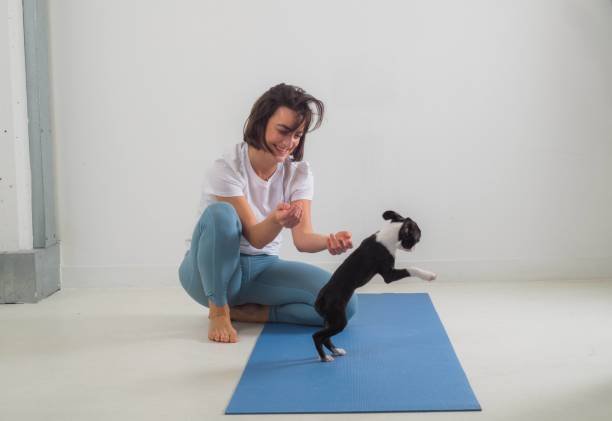
While Boston Terriers do not have any breed-specific exercise needs, they are known for their adaptability to various living environments. Here are some additional considerations:
1. Indoor Exercise: Boston Terriers are well-suited to indoor living, making them great apartment dogs. You can engage them in indoor games like hide-and-seek or use puzzle toys to keep them active during inclement weather.
2. Avoid Extreme Temperatures: Due to their short coat and sensitivity to heat and cold, be cautious when exercising your Boston Terrier in extreme temperatures. During hot weather, opt for early morning or late evening walks to avoid the heat of the day.
3. Water Play: Some Boston Terriers enjoy water play, so if you have access to a safe and shallow pool or a dog-friendly beach, they may delight in splashing around. Always supervise them near water.
Nutrition and Feeding Guidelines
Proper nutrition is vital to your Boston Terrier’s health and well-being. Here are specific dietary recommendations based on their size, age, and activity level:
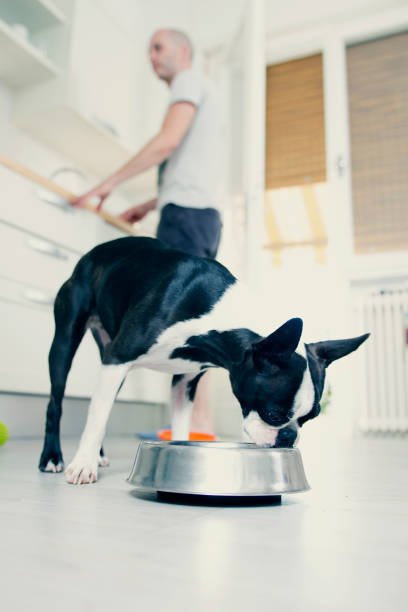
1. High-Quality Dog Food: Choose a high-quality commercial dog food that is appropriate for your Boston Terrier’s age, size, and activity level. Look for options that list meat as the primary ingredient.
2. Portion Control: Be mindful of portion sizes to prevent overfeeding and obesity. Follow the feeding guidelines provided on the dog food packaging and adjust based on your dog’s individual needs. Consult your veterinarian for personalized recommendations.
3. Age-Specific Diets: Puppies, adult, and senior Boston Terriers have different nutritional requirements. Ensure you’re feeding them an age-appropriate diet.
4. Protein and Fat: Boston Terriers benefit from diets with moderate levels of protein and fat to maintain their energy levels and lean muscle mass. Look for foods with protein content between 18% and 25% and a fat content of 5% to 15%.
5. Avoid Table Scraps: Refrain from feeding your Boston Terrier table scraps or human food, as some ingredients can be harmful to dogs. Stick to their designated dog food.
6. Fresh Water: Always provide fresh and clean water for your Boston Terrier. Proper hydration is essential for their health.
7. Dietary Restrictions: Some Boston Terriers may have allergies or specific dietary restrictions. Consult with your veterinarian if you suspect your dog has food sensitivities or allergies.
8. Feeding Schedule: Establish a regular feeding schedule with set mealtimes. This routine helps with housebreaking and digestion.
In conclusion, providing your Boston Terrier with a well-rounded exercise plan and a balanced diet tailored to their age and activity level is essential for their overall health and happiness. Regular exercise not only keeps them physically fit but also mentally stimulated, preventing boredom and behavioral issues. Proper nutrition ensures they receive the necessary nutrients for a healthy life. Remember that every dog is unique, so it’s essential to adjust their exercise and dietary plans based on their individual needs and consult with your veterinarian for guidance.
Socialization and Training Tips
Socialization and training are essential aspects of raising a well-behaved and well-adjusted Boston Terrier. This section will provide breed-specific training tips tailored to their temperament and intelligence. Additionally, we’ll offer advice on how to socialize Boston Terriers with other dogs and people.
Training Tips
Boston Terriers are intelligent and quick learners, but they can also be a bit stubborn at times. Effective training methods and consistency are key to ensuring they grow into well-behaved companions:
1. Positive Reinforcement: Boston Terriers respond well to positive reinforcement training. Use treats, praise, and rewards to reinforce good behavior and desired commands.
2. Consistency: Establish clear rules and boundaries from the beginning. Be consistent in your commands, expectations, and rewards. Inconsistency can confuse your Boston Terrier.
3. Start Early: Begin training and socialization as early as possible. Puppies are more receptive to learning and adapting to new experiences. Early training sets a strong foundation for their behavior.
4. Basic Commands: Teach basic commands like “sit,” “stay,” “down,” “come,” and “leave it.” These commands are not only useful but also help establish your role as the leader.
5. Leash Training: Boston Terriers can be prone to pulling on the leash due to their energetic nature. Consistent leash training will help prevent this behavior.
6. Obedience Classes: Consider enrolling your Boston Terrier in obedience classes, especially if you’re a first-time dog owner. Professional trainers can provide guidance and structured training sessions.
7. Socialization: Regularly expose your Boston Terrier to various people, animals, and environments. Proper socialization helps them become confident and well-mannered dogs.
8. Be Patient: Boston Terriers may sometimes be a little headstrong. Be patient and maintain a calm demeanor during training sessions. Avoid harsh punishment, as it can lead to fear or aggression.
Socialization Tips
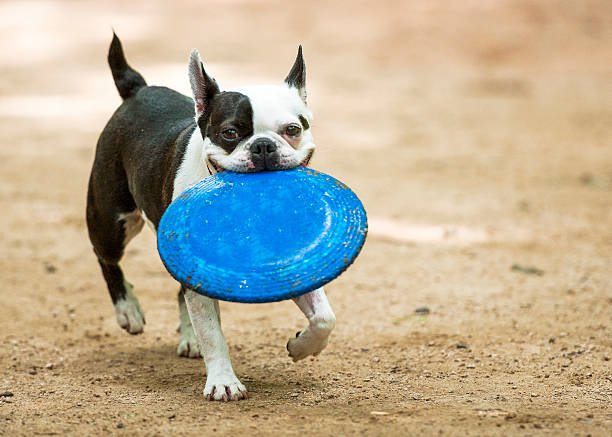
Boston Terriers are known for their friendly and sociable nature, but proper socialization is still essential to ensure they interact well with other dogs and people:
1. Puppy Playdates: Arrange playdates with other puppies or well-behaved adult dogs. Supervise the interactions to ensure they are positive and safe.
2. Dog Parks: Visit dog parks where your Boston Terrier can meet and interact with other dogs. Ensure the park is secure and that the dogs are well-behaved.
3. Controlled Meetings: When introducing your Boston Terrier to new dogs, do so in a controlled environment with leashes and under supervision.
4. Exposure to Different People: Expose your Boston Terrier to various people, including different ages, genders, and appearances. This helps them become comfortable around strangers.
5. Novel Environments: Take your Boston Terrier to different places like parks, pet-friendly stores, and outdoor events. These experiences broaden their horizons and make them more adaptable.
6. Positive Experiences: Ensure that socialization experiences are positive and fun. Reward your Boston Terrier with treats and praise for good behavior during social interactions.
Common Behavioral Traits
Boston Terriers are known for their endearing personalities, but like all breeds, they come with a set of common behavioral traits, both positive and challenging. Understanding these traits is crucial for effective training and managing their behavior.
Positive Behavioral Traits
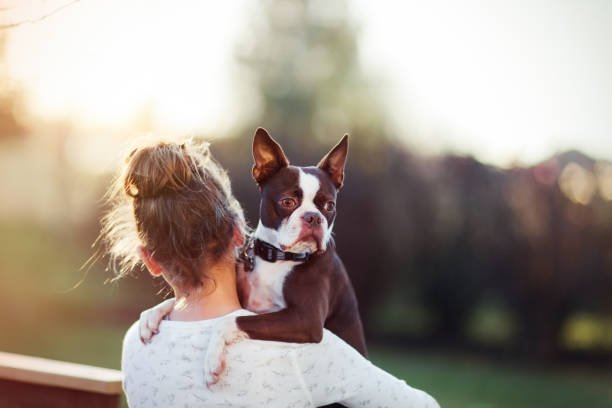
1. Friendly and Affectionate: Boston Terriers are known for their friendly and affectionate nature. They form strong bonds with their families and are often referred to as “Velcro dogs” because they love to be close to their humans.
2. Playful: Boston Terriers have a playful and lively disposition. They enjoy interactive play and games, making them excellent playmates for children.
3. Intelligent: This breed is smart and quick to learn new commands and tricks. Their intelligence makes them eager participants in training sessions.
4. Alert: Boston Terriers are naturally alert and make excellent watchdogs. They will alert you to any potential intruders with their distinctive bark.
5. Adaptability: Boston Terriers are adaptable and can thrive in various living environments, from apartments to houses with yards.
Challenging Behavioral Traits
1. Stubbornness: While their intelligence is an asset, it can also lead to stubbornness at times. Boston Terriers may occasionally choose to ignore commands if they don’t see the point.
2. Separation Anxiety: Boston Terriers are prone to separation anxiety and may become distressed when left alone for extended periods. Crate training and gradual departures can help manage this behavior.
3. Prone to Overheating: Due to their brachycephalic (flat) faces, Boston Terriers are sensitive to extreme temperatures. They can overheat quickly in hot weather, so it’s important to avoid excessive exercise in high temperatures.
4. Prey Drive: Boston Terriers may have a slight prey drive, which means they might be inclined to chase smaller animals. Supervision is necessary when introducing them to other pets.
5. Flatulence: Some Boston Terriers are prone to flatulence, which can be attributed to their brachycephalic anatomy. Feeding them high-quality dog food and avoiding table scraps can help alleviate this issue.
In conclusion, Boston Terriers are known for their friendly and playful nature, making them wonderful companions. Effective training and early socialization are essential to channel their intelligence and enthusiasm positively. Understanding both their positive and challenging behavioral traits will help you provide the guidance and care they need to thrive as loving members of your family.
Personal Stories and Testimonials
To provide a more intimate and practical perspective on Boston Terriers, we’ve gathered real-life stories and testimonials from owners of the breed. These anecdotes offer insights into the joys, challenges, and the costs associated with owning a Boston Terrier.
A Loving Companion: Emily’s Story
Emily, a schoolteacher from Chicago, shares her heartwarming experience with her Boston Terrier, Max.

“My journey with Max began when I adopted him from a local rescue about five years ago. I was drawn to Boston Terriers because of their charming personalities, and Max did not disappoint. From the moment he came into my life, he’s been an endless source of joy.
One of the things I love most about Max is his unwavering loyalty. He’s my constant companion, whether I’m grading papers at home or going for a long walk in the park. Boston Terriers are known for being affectionate, and Max takes it to the next level. His cuddles and snuggles are the best stress-relievers.
However, it’s not all smooth sailing. Max has a bit of a stubborn streak. Training him was an adventure, but it was worth every moment. He’s incredibly intelligent, and once we figured each other out, he became a well-mannered and obedient dog.
In terms of expenses, I’ll be honest; Boston Terriers can be a bit of a financial commitment. Their health is a priority, and regular vet visits are a must. Max had some skin allergies in the past, which required medication and special grooming products. Speaking of grooming, Boston Terriers have short coats, which is a plus in terms of shedding, but they still need regular baths and ear cleaning. It’s all part of keeping them healthy and comfortable.
Despite the costs and occasional stubbornness, I wouldn’t trade Max for the world. He’s brought so much love and laughter into my life, and I can’t imagine my days without him.”
The Dynamic Duo: Sam and Luna
Sam and Luna, a couple from New York City, share their experience of raising two Boston Terriers, Luna and Dexter.

“We’ve always been dog lovers, and when we decided to add a furry member to our family, Boston Terriers were at the top of our list. Luna came into our lives first, and she’s been our bundle of energy and joy for three years now. She’s incredibly playful and keeps us active with her love for fetch and running around the park.
When we saw how much Luna loved company, we decided to adopt another Boston Terrier, Dexter, a year later. The two of them together are an absolute riot. They have the quirkiest personalities and keep us laughing all the time.
The social aspect of Boston Terriers is one of the things we love most. They’re friendly with other dogs and adore meeting new people. Our walks in the city often turn into mini meet-and-greets as people can’t resist their adorable faces.
In terms of expenses, having two Boston Terriers does come with its costs. From food to vet bills, it adds up. Regular exercise is crucial for their well-being, so we’re at the park daily. We’ve also invested in some interactive toys to keep them mentally stimulated. Their health and happiness are our top priorities, so we don’t mind the expenses.
One thing we’ve learned is that Boston Terriers are incredibly adaptable. We live in a small apartment in the city, and they’ve adjusted beautifully. They’re just as happy on a long hike as they are cuddling on the couch.
Overall, Boston Terriers have added so much love and fun to our lives. They’re affectionate, entertaining, and full of surprises. We wouldn’t have it any other way.”
Pros and Cons of Having a Boston Terrier

As with any breed, there are pros and cons to consider when bringing a Boston Terrier into your life. Here’s a concise overview:
Pros:
- Loving Companionship: Boston Terriers are incredibly affectionate and form strong bonds with their owners.
- Playful Nature: They have a playful and lively disposition, making them great playmates.
- Adaptability: Boston Terriers can thrive in various living environments, including apartments and houses with yards.
- Low Shedding: Their short coats result in minimal shedding, making them a good choice for those with allergies.
- Alertness: They make excellent watchdogs due to their alert nature.
Cons:
- Stubbornness: Boston Terriers can be a bit stubborn, which may require patience during training.
- Separation Anxiety: They are prone to separation anxiety and may become distressed when left alone.
- Health Expenses: Regular vet visits and potential breed-specific health issues can result in higher medical expenses.
- Flatulence: Some Boston Terriers are prone to flatulence, which can be unpleasant.
In conclusion, owning a Boston Terrier comes with its joys and challenges, as with any pet. The key is providing love, care, and attention to ensure they lead happy and healthy lives. These personal stories and testimonials provide a glimpse into the unique experiences of Boston Terrier owners and the strong bonds they share with their furry companions.
Breed-Specific Accessories and Care Products for Boston Terriers
Caring for your Boston Terrier involves more than just providing food and shelter. To ensure their well-being and keep them happy, there are specific accessories and care products designed with their needs in mind. In this section, we’ll recommend a range of items tailored to the Boston Terrier breed, from grooming tools to toys.
Grooming Tools
- 1. Slicker Brush: Boston Terriers have short, smooth coats that require regular brushing to remove loose hair and distribute natural oils. A slicker brush with soft bristles is gentle on their skin while effectively reducing shedding.
- 2. Rubber Grooming Mitt: A rubber grooming mitt is excellent for a quick once-over to remove loose fur. It also provides a gentle massage, which Boston Terriers often enjoy.
- 3. Ear Cleaning Solution: Boston Terriers can be prone to ear infections due to their floppy ears. Use a vet-recommended ear cleaning solution to keep their ears clean and healthy.
- 4. Toothbrush and Toothpaste: Dental health is crucial for all breeds, including Boston Terriers. Invest in a dog-specific toothbrush and toothpaste to maintain their oral hygiene.
- 5. Nail Clippers: Regular nail maintenance is essential to prevent overgrown nails, which can be uncomfortable for your Boston Terrier. Choose clippers designed for small dog breeds.
- 6. Shampoo and Conditioner: Opt for a mild, hypoallergenic dog shampoo and conditioner to keep their coat clean and soft. Avoid products with strong fragrances that can irritate their sensitive skin.

Harnesses and Collars
- 1. Harness: Boston Terriers can be prone to respiratory issues due to their brachycephalic (flat) faces. Consider using a harness instead of a collar to reduce the risk of neck injury and improve control during walks.
- 2. Adjustable Collar: If you prefer using a collar, choose one with adjustable straps to ensure a comfortable fit. Avoid collars that are too tight, as they can restrict breathing.
Toys and Entertainment
- 1. Interactive Puzzle Toys: Boston Terriers are intelligent and enjoy mental stimulation. Interactive puzzle toys, like treat-dispensing puzzles, keep their minds engaged and provide hours of entertainment.
- 2. Chew Toys: Chew toys are essential for dental health and can help alleviate boredom. Opt for durable, non-toxic options that are suitable for small breeds.
- 3. Fetch Toys: Boston Terriers love to play fetch. Invest in sturdy balls or toys designed for fetching to keep them active and engaged.
- 4. Plush Toys: Many Boston Terriers enjoy cuddling with plush toys. Look for ones that are the right size for your dog to carry around comfortably.
Dog Beds and Crates
- 1. Comfortable Dog Bed: Provide your Boston Terrier with a cozy and comfortable bed to relax on. Look for beds with memory foam or orthopedic support, especially if your dog is older.
- 2. Crate: Crates are useful for house training and providing a safe space for your Boston Terrier. Ensure the crate is the right size—big enough for them to stand, turn around, and lie down comfortably.
Feeding Accessories
- 1. Stainless Steel Bowls: Boston Terriers can be sensitive to certain materials, so opt for stainless steel bowls for food and water. They are easy to clean and durable.
- 2. Slow Feeder Bowl: Some Boston Terriers eat quickly, which can lead to digestive issues. A slow feeder bowl encourages them to eat more slowly and aids in digestion.
Travel Accessories
- 1. Travel Carrier: When traveling with your Boston Terrier, a comfortable and well-ventilated travel carrier is essential for their safety and comfort.
- 2. Car Seat Belt: Ensure your dog’s safety in the car with a seat belt designed for small dogs. This prevents them from roaming freely and causing distractions.
Health and Care Products
- 1. Flea and Tick Preventatives: Boston Terriers can be susceptible to flea and tick infestations. Consult your vet for appropriate flea and tick preventatives.
- 2. Doggy Dental Kit: In addition to regular brushing, a doggy dental kit that includes dental chews or treats can help maintain their oral health.
- 3. Health Supplements: Depending on your Boston Terrier’s specific health needs, your vet may recommend supplements like joint supplements for older dogs or omega-3 fatty acids for coat health.
These breed-specific accessories and care products are designed to enhance the well-being of your Boston Terrier. Remember to consult with your veterinarian for personalized recommendations, especially if your dog has specific health concerns or dietary requirements. By providing the right tools and products, you’ll ensure that your Boston Terrier leads a happy and healthy life as a cherished member of your family.
Frequently Asked Questions (FAQs) About Boston Terriers
Here are the answers to some of the most common questions about Boston Terriers, covering various aspects of this delightful breed:
1. What is the origin of the Boston Terrier breed?
The Boston Terrier breed originated in the United States in the late 19th century. It was developed by crossing the now-extinct White English Terrier and the Bulldog, resulting in a distinct and charming breed with a rich history.
2. Do Boston Terriers shed a lot?
No, Boston Terriers are not heavy shedders. They have short, fine coats that result in minimal shedding compared to breeds with longer hair. Regular brushing can help manage their shedding.
3. Are Boston Terriers prone to specific health issues?
Yes, Boston Terriers can be prone to certain health issues, including brachycephalic syndrome due to their flat faces, allergies, and joint problems. Regular vet check-ups are essential for early detection and prevention.
4. Are Boston Terriers good with children and other pets?
Generally, Boston Terriers are excellent family dogs and get along well with children and other pets when properly socialized. However, supervision is necessary when introducing them to smaller pets due to their slight prey drive.
5. Do Boston Terriers require a lot of exercise?
Boston Terriers have moderate exercise needs. Daily walks and playtime are usually sufficient to keep them happy and healthy. However, they do enjoy interactive play and mental stimulation.
6. How big do Boston Terriers get?
Boston Terriers are a small breed. On average, they weigh between 12 to 25 pounds and stand around 15 to 17 inches tall at the shoulder.
7. Are Boston Terriers easy to train?
Boston Terriers are intelligent and can be trained successfully with positive reinforcement techniques. However, they can also be a bit stubborn at times, so patience and consistency are key.
8. Do Boston Terriers make good apartment dogs?
Yes, Boston Terriers are well-suited to apartment living. They adapt to their environment and are generally not overly noisy, making them excellent urban companions.
9. What is the typical lifespan of a Boston Terrier?
Boston Terriers have a relatively long lifespan compared to some other breeds. On average, they live between 11 to 13 years, although some can live even longer with proper care.
10. How do I find a reputable Boston Terrier breeder or rescue organization?
To find a reputable breeder, do your research and look for breeders who prioritize the health and well-being of their dogs. For rescue organizations, check with local animal shelters, breed-specific rescues, or websites dedicated to Boston Terrier adoptions.
These frequently asked questions provide valuable insights into the Boston Terrier breed, helping potential owners make informed decisions about welcoming these delightful dogs into their homes.
Conclusion
In this comprehensive guide, we’ve delved deep into the world of Boston Terriers, offering insights into their history, characteristics, care requirements, and more. As we conclude, let’s summarize the key points, emphasize responsible ownership, and encourage adoption.
Recap of Key Points
1. Boston Terrier Origin: Boston Terriers have a fascinating history, originating in the United States through careful breeding.
2. Physical Characteristics: They are a small breed with distinctive tuxedo-like black and white markings. Their short coat requires minimal grooming.
3. Temperament: Boston Terriers are friendly, affectionate, and known for their charming personalities. They are great companions for families.
4. Health Considerations: This breed can be prone to certain health issues, including brachycephalic syndrome, allergies, and joint problems. Regular vet check-ups are essential.
5. Exercise and Training: Boston Terriers have moderate exercise needs and respond well to positive reinforcement training methods. Early socialization is crucial.
6. Responsible Ownership: Owning a Boston Terrier comes with responsibilities, including proper care, training, and providing a loving home.
Emphasizing Responsible Ownership
Responsible ownership of a Boston Terrier goes beyond providing food and shelter. It entails understanding the breed’s unique needs, ensuring their physical and mental well-being, and fostering a loving and nurturing environment. Here are some key points to remember:
1. Regular Veterinary Care: Schedule regular check-ups with a trusted veterinarian to monitor your Boston Terrier’s health and address any concerns promptly.
2. Balanced Diet: Provide a balanced and appropriate diet tailored to their age, size, and activity level. Be mindful of portion control to maintain a healthy weight.
3. Exercise and Mental Stimulation: Engage your Boston Terrier in daily exercise and mental stimulation activities to keep them physically fit and mentally sharp.
4. Socialization: Early socialization is crucial to ensure they are well-behaved around people and other pets. Regular interaction with various environments and experiences helps them adapt better.
5. Grooming: While they have short coats, regular grooming is essential to maintain their hygiene and skin health. Cleaning their ears and brushing their teeth should also be part of the routine.
6. Training and Positive Reinforcement: Use positive reinforcement techniques during training to foster a strong bond with your Boston Terrier and ensure they are well-behaved.
7. Love and Attention: Boston Terriers thrive on human interaction and affection. Spend quality time with them, and they’ll reward you with unwavering loyalty and companionship.
Encouraging Adoption
While acquiring a Boston Terrier from a reputable breeder is a valid option, we also encourage potential pet owners to explore adoption. Many Boston Terriers are in need of loving homes through rescue organizations and shelters. Adopting a rescue dog not only gives a deserving dog a second chance but also contributes to responsible pet ownership.
Here are some steps to consider if you’re interested in adopting a Boston Terrier:
1. Research: Look for Boston Terrier-specific rescue organizations or animal shelters in your area. They often have detailed profiles of available dogs.
2. Visit Shelters: Visit local animal shelters or rescue events to meet potential Boston Terrier companions in person.
3. Ask Questions: Ask questions about the dog’s background, behavior, and any special needs. A reputable rescue organization will provide full disclosure.
4. Home Visit: Be prepared for a home visit as part of the adoption process. This is to ensure that your living situation is suitable for a Boston Terrier.
5. Adoption Fees: Be aware that adoption fees typically apply. These fees help cover the cost of vaccinations, spaying/neutering, and other essential care.
6. Be Patient: Finding the right match may take time. Be patient and committed to providing a forever home for a Boston Terrier in need.
By considering adoption, you not only welcome a wonderful companion into your life but also contribute to the well-being of dogs in need. Boston Terriers are known for their loving and loyal nature, making them fantastic additions to any family.
In conclusion, Boston Terriers are charming, affectionate, and adaptable dogs that make wonderful companions. By embracing responsible ownership and considering adoption, you can provide a loving and fulfilling life for these delightful dogs while enriching your own life with their presence.























